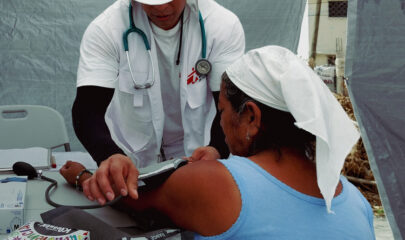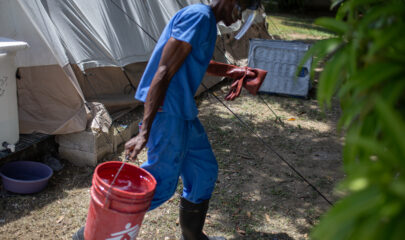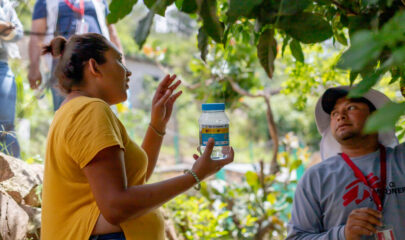For migrants and refugees, Libya is not a safe place because of a well-documented cycle of violence and abuse. In a new report titled out of Libya, doctors without borders/médecins sans frontières (MSF) is advocating for wider state authorities and governments to open new pathways – evacuation routes and processes – so people on the move can receive dignified and safe support.
As of November 2021, Libya was home to an estimated 600,000 displaced people from more than 44 countries. They are men, women and children looking for safe- ty and security. But their reality in Libya is often quite different: incarceration, torture, human trafficking and threats, including payment in exchange for freedom.
“They make us call our families and demand a ransom and threaten to kill us [if they don’t pay],” says Jimmy*, a 24-year-old Senegalese man. “Libya drives you crazy to the point that you don’t know how you will ever get out.” Jimmy was rescued in January 2022 by the Geo Barents, MSF’s search and rescue vessel on the Mediterranean Sea.
According to Jérôme Tubiana, MSF’s mi- gration advocacy officer for Libya: “Being a migrant in Libya means running the risk of being arrested without access to the judicial system, detained in appalling con- ditions, sold to a trafficking network and exposed to potentially extreme violence.”
SURVIVING IN A STATE OF FEAR AND INSECURITY
Tino*, 18, fled Nigeria and then Libya before being rescued on the Mediterranean by the Geo Barents along with 112 other migrants in March of this year. “As a black woman, you can’t do anything in Libya,” she says. “You live in constant fear. You can’t just walk wherever you please during the day because someone could kidnap you, torture you, rape you or force you into prostitution. I know many women who have been tortured and raped in prison.”
“With no safe options in Libya, many migrants, refugees and other people on the move are only able to find safety by leaving the country,” says Tubiana.
LEAVING LIBYA IS EASIER SAID THAN DONE
Since 2011, the number of migrants and refugees attempting to get out of Libya has been constantly increasing. However, safe, legal options for those who wish to leave the country are limited. Many will undertake the trip over land by taking the same risks they endured to get to Libya in the first place. Others will attempt to cross the Mediterranean Sea, a perilous journey that entails the risk of drowning or being intercepted by the EU-supported Libyan Coast Guard and forced back to Libya.
Some will pin their hopes on the Volun- tary Humanitarian Return program run by the UN’s International Organization for Migration. “Although this program can help people travel back to their country of origin, the concept of how ‘voluntary’ a return is, especially when it is the only way to escape arbitrary detention, is question- able,” says Tubiana.
Every year, a limited number of people falling under the jurisdiction of the United Nations High Commissioner for Refugees (UNHCR) are resettled in third countries. The combination of a lack of places in the host countries, the selection of individuals in need of international protection and the challenges of implementing the UNHCR’s mandate create delays that leave people to languish in danger and uncertainty.
OPENING NEW EVACUATION ROUTES
MSF is making a number of recommenda- tions for host nations, including those in Europe and North America, to open more efficient and faster evacuation routes and processes that work together with mech- anisms already in place so migrants and refugees are able to safely leave Libya.
Moreover, MSF is urging the European Union and its member states to review their migration policies, resume their own search and rescue operations and immediately withdraw all political and financial support for the Libyan Coast Guard.
“We are advocating for not only the reset- tlement of migrants and refugees,” says Tubiana, “but also the evacuation from Libya, for the sake of human rights, of all those who are survivors of violence.”
*Names changed to protect privacy.

1 Libyan Dinar ($0.25) for each kilogram of metal he collects. Libya, 2020.



